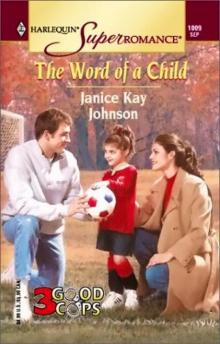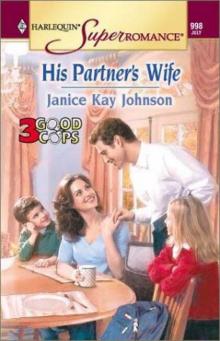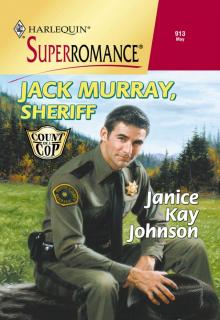- Home
- Janice Kay Johnson - His Best Friend's Baby
Turning Home
Turning Home Read online
PRAISE FOR THE NOVELS OF
JANICE KAY JOHNSON
“Janice Kay Johnson wins our hearts with appealing characters in this poignant tale of sacrifice, healing, and family relationships.”
—Romantic Times
“Well-written characters living through complex situations that are neither glossed over nor magically solved. . . . A lovely romance with strong, likable characters.”
—Her Hands, My Hands
“Johnson writes in a way that conveys real life very well and, at the same time, makes romance seem possible for normal people in everyday places.”
—All About Romance
“Believable characters that demonstrate admirable growth and sensitivity. Remarkable in scope, beautifully realized with plot and characterizations . . . very highly recommended.”
—Word Weaving
A JOVE BOOK
Published by Berkley
An imprint of Penguin Random House LLC
penguinrandomhouse.com
Copyright © 2020 by Janice Kay Johnson
Scripture taken from the New King James Version®. Copyright © 1982 by Thomas Nelson. Used by permission. All rights reserved.
Penguin Random House supports copyright. Copyright fuels creativity, encourages diverse voices, promotes free speech, and creates a vibrant culture. Thank you for buying an authorized edition of this book and for complying with copyright laws by not reproducing, scanning, or distributing any part of it in any form without permission. You are supporting writers and allowing Penguin Random House to continue to publish books for every reader.
A JOVE BOOK, BERKLEY, and the BERKLEY & B colophon are registered trademarks of Penguin Random House LLC.
Ebook ISBN: 9780593197974
First Edition: September 2020
Cover art by PixelWorks
Cover design by Katie Anderson
This is a work of fiction. Names, characters, places, and incidents either are the product of the author’s imagination or are used fictitiously, and any resemblance to actual persons, living or dead, business establishments, events, or locales is entirely coincidental.
pid_prh_5.6.0_c0_r0
Contents
Cover
Praise for Janice Kay Johnson
Title Page
Copyright
Dedication
Chapter One
Chapter Two
Chapter Three
Chapter Four
Chapter Five
Chapter Six
Chapter Seven
Chapter Eight
Chapter Nine
Chapter Ten
Chapter Eleven
Chapter Twelve
Chapter Thirteen
Chapter Fourteen
Chapter Fifteen
Chapter Sixteen
Chapter Seventeen
Chapter Eighteen
Chapter Nineteen
Chapter Twenty
Chapter Twenty-One
Chapter Twenty-Two
Chapter Twenty-Three
Chapter Twenty-Four
Chapter Twenty-Five
Chapter Twenty-Six
Epilogue
About the Author
Without Jill Marsal, my wonderful literary agent,
this book, the start of a new direction for me,
wouldn’t have happened. Thank you, Jill!
Chapter One
JULIA DURANT WASN’T a very good liar. Lying to her brother, in particular, was chancy, because his years in law enforcement seemed to have honed his ability to catch untruths. And, heaven help her, all he’d asked was what her plans were for today.
The fact that Nick stood with his back to her as he poured himself another cup of coffee bought her a few seconds.
She had to say something.
“Oh, I’ll probably keep exploring.” That’s good, she congratulated herself. Casual. “I haven’t driven out to see that covered bridge yet, and I’m told there’s another fabric store in Dunnington.”
“Seen one, seen ’em all.” His teasing grin relieved her.
Somehow, she doubted the greater public had ever seen police chief Nicholas Durant anything but stern. He’d developed that guarded cop look into an art form, which did not deter the women who chased him.
She rolled her eyes at his teasing. “Should I wait to start dinner until you call?” He’d cut back his hours the first week of her visit, but when she continued to leave her departure date open, he’d reverted to his usual working habits.
“Probably best.”
Two minutes later, he went out the door.
Once she was positive he was gone, she hurried to clean up, check her appearance in the mirror, and rush out to her rental car in the driveway. She did have plans that both scared and exhilarated her.
She was looking for a job . . . and if she found one, her stay in Tompkin’s Mill, Missouri, would no longer be a vacation. It would be a new start for her.
* * *
* * *
FINGERS CROSSED, JULIA asked first at the Stitch in Time Quilt Shop. A quilter herself, she’d already gone in twice, once to pick up fabric and then again for a new packet of tiny needles and some thread. Today, she had brought in a quilt in hopes the owner would admire it enough to agree to sell it on consignment. She’d had a store back home that did that. The moment she’d laid out the quilt today, the two women working at the store had touched it with pleasure and immediately suggested a sale price. That, at least, felt like a triumph. She felt at home among the women she’d seen there, although many were Amish. It didn’t seem to matter, since quilters spoke their own language.
But when she asked if there were any job openings at the store, she was met with a regretful headshake. The younger Amishwoman brightened immediately, however. “My daad needs to hire someone to answer phones and show his furniture. His place, it’s only a block away.”
Outside, reflecting off the sidewalk, the June sun felt blistering. This was far and away the hottest day since she arrived twelve days ago. Given that July through September was reputed to be far hotter, she’d better toughen up. Julia blinked away a salty bead of sweat that stung one eye. She could learn to like—or at least endure—the heat and humidity if she had the chance to stay here.
She loved the fact that Tompkin’s Mill had a thriving downtown, and no big-box stores on the outskirts. The town, while good-sized, was also old-fashioned in some ways, with few stoplights and no buildings over two stories except for the combined city hall and police station. Originally established on the banks of Tompkin’s Creek—beginning with a gristmill—the town was built on land that was flat as a pancake, surrounded by the rolling, wooded hills typical of much of northern Missouri.
Hurrying along, Julia skipped all the businesses on the block between the quilt shop and her destination. A few others appeared to be Amish-owned, as well, including a cabinetmaker’s shop and the bakery. She could come back to them. Last week, she’d peered wistfully in the window of Bowman & Son’s Handcrafted Furniture. The sign itself had letters etched into polished wood. It was handsome, but not fancy. The Amish didn’t do fancy.
And yet, every piece she’d seen on the sales floor was exquisite: gorgeous woods gleaming with hand-rubbed finishes, the lines of the chests and tables and cupboards distinctive, inlays of secondary woods seamless. She hadn’t needed to see price tags to know she probably couldn’t afford a quilt rack.
Now, she didn’t let herself so much as hesitate. If Mr. Bowman hired her, she could admire the furniture to her heart’s content.
Clutching her handbag, she pushed her way inside. A bell on the door rang, but there was nobody behind the counter or in the display room. Neither Mr. Bowman nor his son popped out immediately to greet what might be a customer, either.
Temptation beckoned. Julia paused to slide her fingers over the silky top of the most beautiful chest of drawers she’d ever seen. Ebony inlay contrasted with the rich color of what she thought must be cherry. The sides curved subtly between the floor and top. She instantly coveted the chest—until she saw the price tag and winced. Hands off.
“Gute mariye.” A man’s voice startled her. He switched to English, probably once he saw her. “May I help you?”
Julia’s head came up and she flushed. “The chest is beautiful. I was just admiring it.”
A strongly built man who was likely in his late fifties or early sixties smiled at her from behind the long wooden counter. Silver strands threaded his brown hair and dominated in the beard that reached the middle of his chest. Of medium height, he wore a blue chambray long-sleeved shirt with suspenders, as the local Amishmen all did. He’d rolled up his sleeves, she saw, and didn’t wear a hat, though the line where it usually compressed his hair was very visible. Amusement in his eyes, he said solemnly, “You are wilkom to do that as long as it pleases you.”
She was afraid she could spend all day stroking the furniture in here.
He felt safe to her, allowing her to relax.
“I . . . thank you. Denke.” She knew that much Deitsh, or Pennsylvania Dutch, as the language was commonly known to most Americans. She squared her shoulders. “Are you Mr. Bowman?”
“Eli Bowman, ja,” he agreed.
“Your daughter . . . Miriam, who works in the quilt shop”—as if he didn’t know his own daughter’s name or where she worked—“she told me you have a job opening.” It was all she could do not to rattle on and detail what kind of job he was supposed to have open, too.
“Ah.” He smiled again. “You’re a quilter?”
“Yes.” She knotted her fingers together in front of her. “I went there first, because I know more about quilting than I do about furniture making. But I can answer phones and do the bookkeeping for any business. Oh—my name is Julia Durant.”
He studied her keenly for a moment, then said, “Come sit down, please.”
A dining room table as gorgeous as the chest held a heap of binders, one open to show photographs of pieces of furniture that presumably were stored elsewhere, or had been sold but could be replicated for a customer.
As she nervously pulled up a chair, a second man appeared in the open doorway leading to the back. Likely in his thirties, he had shoulders wide enough to block her view into the back, which she guessed was a workroom. A fleeting glance at him triggered her alarms. She lifted her chin in response, refusing to let either man see to her fearful core.
“Daad?” His eyes, a vivid blue, settled on her, narrowing slightly at whatever he saw on her face. To his father, he continued in Deitsh. Unfortunately, she couldn’t understand a word he said in a slow, deep voice.
The senior Bowman—for the second man had to be the son—shook his head. “No. Julia Durant is not here to buy furniture. She would like to work for us.”
A flicker of something she absolutely could not interpret crossed the younger man’s face. Dislike? Concern, at least.
He had to be six inches taller than his father, as much as six foot one or two, Julia guessed. His hair had started out about the same shade as his father’s, but the sun had glazed it with gold. The fact that his angular jaw was clean-shaven signaled his unmarried state. Curiously, he had shaggy hair not quite long enough to be cut in the typical Amish style. Yet he, too, wore a light blue shirt, broadfall trousers, and suspenders that she knew, from seeing men on the street, stretched in a Y across what had to be a broad, powerful back.
“My son,” Eli said, pride in his voice. “Luke works here with me in the shop. Sometimes we have another helper, to sweep or do small jobs, but mostly we work alone.”
Her disappointment was greater than it should have been, especially given her complicated reaction to Luke Bowman. She could apply at other businesses. “Oh. So you don’t have a job available.” She started to push back the chair. “I’m sorry to have bothered you.”
“No, no. A bodderation you are not.”
Eli’s slip back into Deitsh surprised her. His English was considerably more fluent than most Amishmen or -women spoke, probably because he dealt every day with customers from the outside world. Englischers, as the Amish would say.
Cheeks flushed, she said, “Well, I’m wasting your time.”
“No, Luke and I agree we do need someone to answer the phone and talk to people who come in the door. We are too busy to make the furniture and sell it. This ‘bookkeeping’ would be gut, too. I have ignored it too much and now it’s a mess.” He was the one to twine his fingers together this time, as if demonstrating a knot.
Julia laughed. “I like numbers.”
Luke’s eyes sharpened on her face. She couldn’t imagine why.
“I don’t speak your language,” she admitted, “but I can learn.”
“Most people who call or come in are Englischers. And we all speak some English.”
She nodded and slid her résumé across the table.
“Durant,” the son said unexpectedly. “The police chief is also named Durant. Are you related?”
He had no accent at all.
“Yes, he’s my brother.” She hesitated. “I came for a visit, but I like Tompkin’s Mill. To stay, I need a job.”
“Your brother doesn’t like it when we won’t talk to him.”
“He understands,” Julia countered. Nick had expressed his frustration about the Amish refusing to report crimes or testify in court, choosing instead to forgive someone who had wronged them. He reluctantly, she thought, also admired them for that same determination. “At least they’re mostly law-abiding,” he’d grumbled at the dinner table a few evenings before.
Eli looked up from the résumé. “The pay will not be as much as you have made.”
Since she hadn’t listed her pay on the résumé, he was betraying some knowledge of the outside world.
“I don’t expect that. It’s not as expensive to live here. I can stay with my brother until I find a small apartment.”
“We don’t offer health insurance, either.” Luke’s face, seemingly all sharp angles and planes, didn’t quite show hostility, but she sensed it just below the surface. “Or pay government taxes. You have to do that yourself.”
“I can manage.” She smiled again at the father. “Like I said, I’m good with numbers.”
“And people?” the son demanded.
She forced herself to meet blue eyes that appeared cold. “When they’re friendly.” That she could challenge him and keep her voice from trembling told her how far she’d come.
Eli turned his head to look at his son. He didn’t say anything, but Luke’s mouth tightened.
“Give us a minute,” Eli said, suddenly formal.
She summoned her best smile. “Yes, of course.”
They disappeared into what was indeed a workroom. Through the half-open doorway, she could see a table saw and part of a wall of cubbies that held small tools and scraps of wood in various sizes and colors. Sawdust lay beneath the table saw, as it had clung to the gold hairs on Luke Bowman’s powerful forearms as well as the front of his shirt. The pleasing scent of fresh-cut wood would always cling to him, too, along with sweat and soap.
Thinking about how he smelled made her stomach tighten. She shouldn’t think about any such thing, not if there was a chance she’d be working here. Though Amish, he didn’t have his father’s air of serenity. He was a man; a big, muscular, domineering man, if she was any judge. She didn’t dare let any part of that draw her. It would only end in disaster.
Julia bent her head and stared at her hands, hearing the men’s voices but unable to understand what they were saying. They weren’t quite arguing, but she’d bet Luke didn’t want his father to hire her. Maybe he was uncomfortable with a woman here all the time who wasn’t of his faith . . . but that didn’t seem like the right explanation.
Their voices stopped. She braced herself. Eli smiled as he returned to the table.
“We would like you to work for us.”
Julia blew out a breath she hadn’t realized she was holding. He explained what they could pay and the hours, which she barely took in. She wanted this job. She might even have accepted ludicrously low pay—but what he offered was acceptable.
She beamed at him. “That sounds fine. I can start anytime.”
His smile was equally broad. “Tomorrow, then. In the morning, we will show you what needs to be done, ja?”
“Yes, please.” A moment later, without having caught even a glimpse of the younger Bowman, she was back out in the heat, hurrying down the sidewalk to her car. She was both excited and a little frightened. This would be a huge change . . . and she had to explain it to Nick.
And tomorrow . . . no, she wouldn’t think about Luke Bowman. Julia suspected he would avoid her as much as he could, and she’d avoid him, too. That should work fine.
* * *
* * *
“WHY HAVE YOU been so quiet this afternoon?” Eli asked as he adjusted the breast strap between the mare’s forelegs.
From long practice Luke checked the crupper beneath Polly’s tail before patting her brown rump. It gave him a moment to switch mentally from English to Deitsh. Even after six months home, he still tended to think in English.
“No reason,” he lied, in the language he had grown up speaking.
His father saw through him, of course, but didn’t call him on it. “You will have dinner with your mamm and me?” he asked.
Luke had fallen into eating too often with his parents and sister. Feeding him made his mother happy. But he was too old to go home as if he were the same boy who had left. He no longer fit in the narrow, too-short bed upstairs in his parents’ home. He had stayed only for a few weeks when he first arrived, until he was able to buy a house on three acres just outside of town. He had never wanted to farm, but once he married, he expected to keep a flock of chickens, perhaps a milk cow, and have an extensive vegetable garden, pasture for several horses as well as the cow, and an orchard. The orchard already on the property was the only part he did have, but for a pasture half-covered by the snarl of blackberry vines run amok. He had no prospects for a wife yet, either, but that would happen. He was already a decade older than the average Amishman when he married.

 Home Deadly Home
Home Deadly Home From Father to Son
From Father to Son All the Lost Little Horses (A Desperation Creek Novel Book 2)
All the Lost Little Horses (A Desperation Creek Novel Book 2) Hide the Child
Hide the Child Within Range
Within Range Between Love and Duty
Between Love and Duty First Comes Baby
First Comes Baby Charlotte's Homecoming
Charlotte's Homecoming In A Heartbeat (HQR Superromance)
In A Heartbeat (HQR Superromance) The Call of Bravery
The Call of Bravery In Hope's Shadow
In Hope's Shadow Anything for Her
Anything for Her Harlequin Superromance September 2014 - Bundle 1 of 2: This Good ManPromises Under the Peach TreeHusband by Choice
Harlequin Superromance September 2014 - Bundle 1 of 2: This Good ManPromises Under the Peach TreeHusband by Choice The Baby Agenda
The Baby Agenda More Than Neighbors
More Than Neighbors Her Amish Protectors
Her Amish Protectors All That Remains
All That Remains Whisper of Revenge (A Cape Trouble Novel Book 4)
Whisper of Revenge (A Cape Trouble Novel Book 4) In a Heartbeat
In a Heartbeat A Mother's Claim
A Mother's Claim Because of a Girl
Because of a Girl Back Against the Wall
Back Against the Wall Dangerous Waters
Dangerous Waters Mommy Said Goodbye
Mommy Said Goodbye A Mother's Secret
A Mother's Secret See How She Runs (A Cape Trouble Novel Book 2)
See How She Runs (A Cape Trouble Novel Book 2) Plain Refuge
Plain Refuge Bringing Maddie Home
Bringing Maddie Home For the Girls' Sake
For the Girls' Sake Through the Sheriff's Eyes
Through the Sheriff's Eyes Yesterday's Gone (Two Daughters Book 1)
Yesterday's Gone (Two Daughters Book 1) All a Man Is
All a Man Is Harlequin Superromance January 2014 - Bundle 1 of 2: Everywhere She GoesA Promise for the BabyThat Summer at the Shore
Harlequin Superromance January 2014 - Bundle 1 of 2: Everywhere She GoesA Promise for the BabyThat Summer at the Shore No Matter What
No Matter What Wakefield College 01 - Where It May Lead
Wakefield College 01 - Where It May Lead Someone Like Her
Someone Like Her THE WORD OF A CHILD
THE WORD OF A CHILD Harlequin Superromance May 2016 Box Set
Harlequin Superromance May 2016 Box Set Open Secret
Open Secret The New Man
The New Man Finding Her Dad
Finding Her Dad The Perfect Mom
The Perfect Mom All Through The House
All Through The House Match Made in Court
Match Made in Court Making Her Way Home
Making Her Way Home From This Day On
From This Day On To Love a Cop
To Love a Cop The Hero's Redemption
The Hero's Redemption HIS PARTNER'S WIFE
HIS PARTNER'S WIFE Jack Murray, Sheriff
Jack Murray, Sheriff Dead Wrong
Dead Wrong Twisted Threads (A Cape Trouble Novel Book 3)
Twisted Threads (A Cape Trouble Novel Book 3) Bone Deep
Bone Deep The Closer He Gets
The Closer He Gets With Child
With Child Whose Baby?
Whose Baby? Kids by Christmas
Kids by Christmas